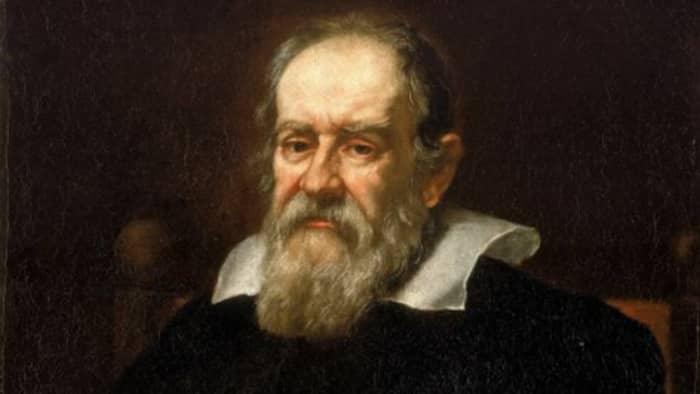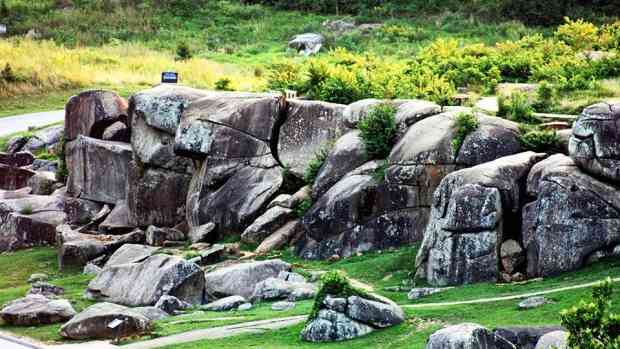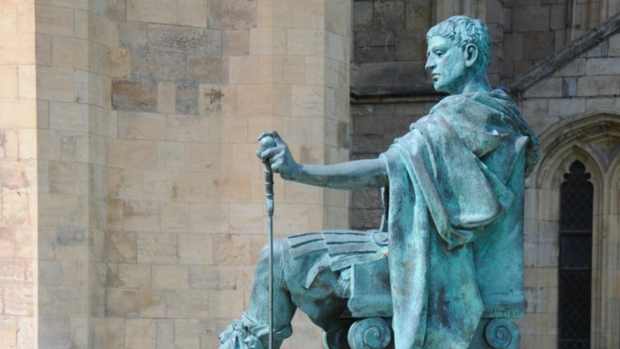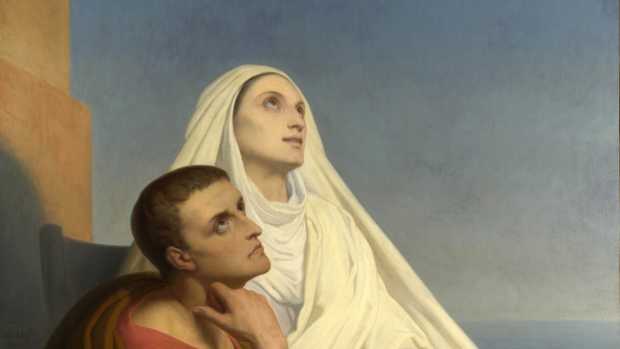The Galileo Myth: Does History Support a Conflict Theory Between Christianity and Science?

Galileo said, "I think in the first place that it is very pious to say and prudent to affirm that the Holy Bible can never speak untruth—whenever its true meaning is understood."
The Conflict Hypothesis
I knew it would happen. I just didn’t know when. Sometime during a college semester, I could usually count on one of my professors to stand up and tell a similar story to this one:
The dark ages was a time of backwardness and superstition. Religion held back progress and enlightenment. The quintessential example of this oppression was Galileo Galilei. He challenged Christianity with his telescope. The Church thought the telescope was bewitched and would not even look through it. They persecuted him and silenced him.
This is often used as an example of why religion and science should be segregated. The problem with the story is that it’s a myth, but it has just enough truth to sound plausible. As one of my colleagues is fond of saying, "Even a stopped clock is right twice a day."
Such a view, which is sometimes called the conflict hypothesis, portrays science and religion as enemies, warring over the right to say what is true about reality. After all, "religion is about faith and science is about facts," or so the assumption goes.
The problem with this hypothesis is that it does not describe much of what has happened historically. This view is less a product of history than a result of some unbelievers who are trying to impose an atheistic Weltanschauung upon society: a view that is antagonistic to the development of Western science.
The Conflict Hypothesis
The Conflict Hypothesis is recent, given the long relationship between science and religion. Although hostility toward Christianity flared during the Enlightenment, it wasn’t until the nineteenth century when the Conflict Hypothesis surfaced. Two prominent books that propagated this view were History of the Conflict between Religion and Science by John William Draper and History of the Warfare of Science with Theology in Christendom by Andrew Dickson White.
Today, both books have been discredited, but their underlying thesis continues to have a long shelf life. As Dinesh D’Souza said, “historians are virtually unanimous in holding that the whole science versus religion story is a nineteenth century fabrication.” (1) Recently, scholars have brought in a richer body of knowledge than just the old Enlightenment apologia and have argued for a more complex picture of the relationship between religion and science historically.
This “Complexity Hypothesis” appears to better explain the facts surrounding one of the most popular myths told by those supporting the Conflict view: the legal drubbing that Galileo received from the Catholic Church in 1633. The Complexity Hypothesis presents a more complicated relationship between science and religion, one that reveals a relationship of both cooperation and tension.
Any good hypothesis should provide a reasonable explanation of the known facts of history, yet the Conflict Hypothesis falls short of an explanation, especially for the events surrounding Galileo and the Catholic Church.
Conflict vs. Complexity: An Analysis
The Conflict Hypothesis poorly assesses the relationship between Christianity, science, and the theories of the earth’s motion during the time of Galileo. Those that promote the Conflict Hypothesis normally ascribe the teaching of geocentricism (the view that the earth is stationary and the center of the universe) to Christianity (“the Bible”) while ascribing heliocentricism (the view that the sun is stationary and the center of the universe) to “science.” The problem with this view is that the Bible does not “teach” geocentricism. The Bible uses phenomenological language to describe conditions within nature.
Today, we still do this when saying things like “the sun is setting.” In fact, Galileo believed that the Bible supported the Heliocentric Theory and used the Bible in defense of his position. Galileo quoted Job 9:6 as a defense of the mobility of the earth. Galileo cites the "Commentary on Job" (1584) by Didacus a Stunica who said that the mobility of the earth is not contrary to Scripture. So, both those that advanced geocentricism and heliocentricism claimed that the Bible supported their position.
Galileo's Stance on the Bible
Galileo believed the Bible was true. He said, "I think in the first place that it is very pious to say and prudent to affirm that the Holy Bible can never speak untruth -- whenever its true meaning is understood." (2) However, Galileo believed that the Bible should be interpreted metaphorically in matters pertaining to nature.
A further problem for the Conflict Hypothesis is that the belief that the Scripture's descriptive language should be taken metaphorically came from the Catholic Church. Galileo’s famous statement that “the Bible tells us how to go to heaven, not how the heavens go” was not original with him, but was the brainchild of Cardinal Cesare Baronius (1548-1607). (3) He, like other Catholics taught that the “Book of Nature” was for the common man, but that the “Book of Scripture” was written metaphorically at times so that the common man could understand it.
Furthermore, the belief was that the Bible had to be filtered through Church tradition and teaching before it could be disseminated and taught to the people. A Catholic, Bible-believing Galileo does not square with the basic assumptions of the Conflict Hypothesis.
Recommended
Next, the roots of Galileo’s beliefs pertaining to heliocentricism were rooted, in part, in his Catholicism, and not just within observational science. In fact, Galileo’s views about heliocentricism were hardly grounded in observational science. The attraction of the heliocentric theory to men like Galileo was not because of the preponderance of physical evidence supporting it (the physical evidence of the time actually supported geocentricism); rather it was because of the predictive power of the theory.
Next, the Conflict Hypothesis assumes that the Christian religion is the great and natural nemesis of empirical science. However, today’s great suppresser of scientific inquiry is not the Roman Church, but rather is what Steven Jay Gould called “Darwinian fundamentalists” (a reference to Richard Dawkins).
In fact, these Darwinian zealots find themselves in the same boat as the Catholic Church of old in that both suppress the teaching that the Bible has the final authority on all matters. The last thing that the Roman church wanted taught was that the Bible was the final authority. The hegemony that the Catholic Church held on science in Christendom is unimpressive compared with the grip that a handful of Darwinists exercise on the community of science today.
The story of Galileo and the Catholic Church as told by those that espouse the Conflict Hypothesis is in bad need of a retelling, a retelling that adds more data than what the Conflict Theory leaves out. The story is a complicated one and certainly is not worthy of the clichés that some secular academics have heaped upon it. Many do not know, for example,
- at the time that Copernicus (and later Galileo) was advancing the heliocentric theory, the evidence supported the geocentric view that the earth was stationary.
- Galileo, while right about the earth moving, was wrong about its rotation. Galileo believed wrongly, like Copernicus, that the planets moved in a circular motion. During Galileo’s day, Johannes Kepler had demonstrated that the planets moved in an elliptical orbit. Galileo, believing the contrary, rejected the hypothesis that the orbit of the earth around the Sun was elliptical. In the words of Colin Russell, “Even Galileo did not actually prove the earth’s motion, and his favorite argument in support of it, that of the tides, was a ‘great mistake.’” (4)
- modern science was berthed within Christendom. Many that pursued scientific studies were churchman. In fact, many of the churchmen who were contemporaries of Galileo were themselves either amateur scientists or followers of scientific progress. When Galileo was censured by the Church, the pope, Urban VIII, had been an admirer of Galileo, even writing a poem about him.
Even the story surrounding Galileo’s teaching of the heliocentric theory and his censure are more complicated than what are commonly portrayed. It is true that Galileo was censured for teaching heliocentricism, but Galileo had complicated the matter by making a commitment, in writing, that he would not teach heliocentricism as true, a pledge he later violated.
Perhaps Galileo should never have made such a pledge or the Church should have never demanded the censure, but this is hardly any worse than the many teachers who are attacked by the current Darwinian establishment for teaching Intelligent Design in the classroom. Scholars like Richard von Sernberg, Caroline Crocker, Robert J. Marks, II, and Guillermo Gonzalez have had their reputations besmirched by careless Darwinian headhunters. (5)
So, where did we get the idea that Galileo was a martyr of empirical science? Where else?—television. Just as many people view the Scopes Trial through the lens of Inherit the Wind, so also people see Galileo through a 1975 film called Galileo which was based on a play by the same name written by Bertolt Brecht in the 1930s. In this film, Galileo is portrayed as a martyr of science and being oppressed by religion.
However, Arthur Koestler in The Sleepwalking, said “I believe the idea that Galileo’s trial was a kind of Greek tragedy, a showdown between blind faith and enlightened reason, to be naively erroneous.” Some Darwinists have tried to paint Galileo in such a fashion, like some kind of “secular saint.” As a story, this is fine; as history, it’s not.
In the end, the Conflict Hypothesis fails as an adequate explanation of the historical relationship between science and religion in the West. It fails to account for how modern science was berthed in Christendom. The Church itself was not an intellectual wasteland, but was the locus of scholarship. When it comes to Galileo, the Church approached the question of the earth’s motion in an empirical fashion, keeping in mind that the bulk of available evidence to Galileo & Co. supported geocentricism.
Furthermore, the Conflict Hypothesis fails to account of how that some of the greatest scientific minds like Bacon, Galileo, Faraday, Newton, Kepler, and Carver were theists, some Christian.
And Finally ...
A question “Who used both religion and empirical observation, but was squashed by the scientific elites of his day”? If you were to say “Galileo” you’d be wrong: Galileo’s lean toward heliocentricism was not rooted in empirical data. But, if you were to say “Guillermo Gonzalez” you’d be correct. Ironically it is today’s Darwinian fundamentalists that use power to squash opposition to their views and close their eyes to the evidence before them.
As for Galileo, Alfred North Whitehead probably summed it up best: “the worst that happened to men of science was that Galileo suffered an honorable detention and a mild reproof, before dying peacefully in his bed.” (6)
Notes
(1) Dinesh D’Souza, What’s So Great about Christianity? (Carol Stream, IL: Tyndale House, 2007), 104.
(2) Galileo in a letter to Madame Christina quoted in Stillman Drake, Discoveries and Opinions of Galileo. Doubleday Anchor Books, 1957.
(3) Richard J. Blackwell, “Galileo Galilei.” In Science and Religion: A Historical Introduction, Gary B. Ferngren, ed. , (Baltimore, MD: the Johns Hopkins University Press, 2002), 111.
(4) Colin A. Russell, “Science and Religion: Conflict or Complexity.” In Science and Religion: A Historical Introduction Gary B. Ferngren, ed. (Baltimore, MD: the Johns Hopkins University Press, 2002), 18.
(5) The attack on these scholars is presented in Ben Stein’s documentary: Expelled: No Intelligence Allowed.
(6) Alfred North Whitehead, quoted in Dinesh D’Souza’s, What’s So Great about Christianity? (Carol Stream, IL: Tyndale House, 2007), 104.
This content is accurate and true to the best of the author’s knowledge and is not meant to substitute for formal and individualized advice from a qualified professional.
© 2010 William R Bowen Jr
Comments
Ron Hooft from Ottawa on June 13, 2011:
"Why did the universe start so many billions of years ago and not trillions? What caused it to start (BB or whatever other theory you choose) at that particular point in time?"
Why did god create us 6000 years ago instead of a trillion? What made him do it? What need does he have that forced him to create us? Who created god? Come now, do you want a serious discussion or not?
I don't advocate the BB and as far as I am concerned there was no beginning. Energy/matter has always existed in one form or other. No god required.
"If prior to the BB (or other starting point), all there was energy and no space or time, how could there be any causes to initiate the inflation of the universe?"
In a singularity there would obviously be behavioral laws though they might not be exactly the ones we have. Obviously there was an imbalance in the system or some other cause. Again, I don't advocate BB theory and there are a lot of varieties of them. Read Hawking's book to see what he thinks. BB is irrelevant to Physicalism.
"If energy has always existed and is always moving from higher potential energy to lower potential energy, how can there be any potential energy left?"
My goodness. Most of it is actual energy as opposed to potential and it can move back and forth between actual and potential. It is not active and then goes static and never does anything again. Are you sure you read the hub?
"The God Hypothesis answers these questions."
It answers nothing. You can not even prove a god exists while it is obvious nature exists. The god hypothesis is just speculation from beginning to end. If you say you know for a fact a god exists you are lying either to yourself, to me or both of us.
"Why can we trust our senses to tell us what is real?"
Who says we always can? That's the point. Imagination does not always correspond to reality. So you can't trust your senses completely nor your interpretation of events.
Hence why your personal proof of god, (not talking about you personally) being from some sort of religious experience, would be suspect to say the least. You may have experienced something but I wouldn't trust your interpretation of it due to your confirmation bias. You believe in a god so attribute all sorts of things to it without justification.
"Why can we trust our rationality? (because it's reasonable? any other circular answers?)"
More straw man arguments. I don't think I have ever said one can trust anything to do with thought. Rationality is a tool like logic. Some people use it well and others don't know how.
"Why do we live as if altruistic love exists?"
Read my hub "No such thing as a selfless act." You'll get a detailed answer. Also my hub on the golden rule might help.
"Again, the God Hypothesis answers these questions. Naturalism does not."
Rubbish. ;) You know that's not true.
jcnasia on June 13, 2011:
Slarty,
I thought of two more questions.
If time did not exist prior to the BB or whatever starting point you choose, how did quantum fluctuations occur? (according to Wikipedia, a quantum fluctuation is the "temporary" change in the amount of energy in a point in space.)
Why do natural laws exist and why can they be so precisely described by mathematics?
jcnasia on June 13, 2011:
Hi Slarty,
I read your new hub, and I've read your comments, and I'm struck with the thought that there is a lot of conjecture without substance. Let me explain, and then maybe you can fill in some of these holes for me.
'The universe works on cause and effect.'
Why did the universe start so many billions of years ago and not trillions? What caused it to start (BB or whatever other theory you choose) at that particular point in time?
If prior to the BB (or other starting point), all there was energy and no space or time, how could there be any causes to initiate the inflation of the universe?
If energy has always existed and is always moving from higher potential energy to lower potential energy, how can there be any potential energy left?
The God Hypothesis answers these questions. The naturalistic worldview only makes up conjectures that either violate what we know about nature or leave us scratching our heads because they raise new questions with even more speculative answers.
Here's some other questions that naturalism doesn't answer.
Why can we trust our senses to tell us what is real? (consider the Matrix)
Why can we trust our rationality? (because it's reasonable? any other circular answers?)
Why do we live as if altruistic love exists? (if you know it does not exist, do you always assume that when others are kind to you, it's purely selfish or manipulative?)
Again, the God Hypothesis answers these questions. Naturalism does not.
Ron Hooft from Ottawa on June 13, 2011:
Just to let you know, I just published a hub called: Entropy Explained. You may be interested in it.
Ron Hooft from Ottawa on June 13, 2011:
"First, saying that matter and energy is everything is tautological."
Hardly. It is a statement of fact.
"Second, the reason why you should accept the “God Hypothesis” is for the reasons you gave. Either God set it in motion or the process is all there is. The second statement is incoherent because it cannot account for the simpler materials that provide for the process. Where did those materials come from? Naturalism has no answer for this question."
What a giant leap. ;) I suppose instead of teaching you all I know about physics in the hope I hit on your meaning, we should start by you telling me what you are on about with the idea that naturalism has no answer to the question of where simpler material came from. But let me take one stab at this for now. There are several models which indicate how atoms formed from subatomic particles. So you ask, where did they come from, right?
Well one of the laws of physics is the law of conservation. First law of thermodynamics tells us energy can not be destroyed and strangely for your viewpoint, can not be created.
You can see why I say this as your view point is that it was created. That seems to be wrong.
Your first statement was that my statement was a tautology. But in fact it is the point.
Let's look at it from the ontological view. If there was ever a state where nothing existed, (and a say state for lack of a better word because nothingness is not a state)
Then nothing could now exist. So something must have always existed for something to now exist.
This is the classic case for the existence of a god. But it does not tell us this god or thing which has always existed has to be intelligent.
There is not one theory in science which tells us energy was ever created. The big bang in all it's forms starts with all the energy that exists in a compressed form.
That's just an example and not meant to endorse the BB theories. The point is that we have an alternative to a god now. Energy has always existed in one dorm or other.
Not only does naturalism have an answer to how the basic materials formed, it tells us they always existed. Not only that, it answers the ontological question as well as a god hypothesis does and better, because it is in the observable laws of nature.
There is nothing but energy is the same as saying there is nothing but god. The word "god" being defined as that which produced us. Do you still consider it a tautology?
"Third, Chaos Theory is unworkable if we’re discussing origins. There must be “something” in chaos that becomes ordered. But what naturalism posits is that nothing existed and then this “nothing” organized and became “something.” But this idea is worse than magic and yet it is embraced by some people."
Well this is a straw man argument if ever there was one.
No one is saying something came from nothing. No one in science says that. And those that have said it don't mean it. That is to say, when a scientist talks about the universe coming from nothing as Hawking does, he is talking about the universe deriving from quantum fluctuation. QF is anything but nothing. It is the constant phenomenon seen everywhere in apparent empty space where "potential" energy becomes actual producing matter and anti matter spontaneously.
QF is a fact. But it is something from potential, not from nothing. It does not violate any physical laws either.
The vacuum of space is not empty. Here is a modern definition of the word which I have in my notes.
"The concept of "vacuum" is not the same as "empty space", as all of space is filled with the quantized fields that make up a universe. Vacuum is simply the lowest possible energy state of these fields, a very different definition from "empty".
So you can see that at times scientists use the same words the rest of us do but put different meaning to them. It is very common and one reason there is so much confusion about these things out in the non-science world. Steps are being taken to clear all this up, and no more so than in the working definitions of entropy and the language of second law thermodynamics.
"Consider these two examples:
1. My bonny lies over the ocean.
2. Zc bfsta vgun soeu aep vcwle.
Both 1 and 2 have an equal amount of complexity. I could keep banging on the keyboard and create greater complexity. This is where you’re correct; greater complexity is unremarkable. I agree. But the difference between 1&2 is that 1 is a set of characters that are arranged to convey a message."
But unfortunately you are giving me an example of the way it does not work. It's like objecting to evolution because you have cut off the tails of a million mice and not a single mouse was born with no tail.
Nature doesn't do things that way. There has to be a need and the response to that need. In the case of the mice, you can bread mice with short to no tails if you select for shorter tailed mice until you produce mice with no tail. In other words you SELECT for them. But cutting them off does nothing to the genetics of the mouse.
You writing gibberish doesn't simulate natural selection. It does not simulate any process driven by cause and effect except the one that is driving you to try to disprove Physicalism. (It used to be called materialism and you seem to call it naturalism)
The universe works on cause and effect, not random gibberish. It works on the principals of conflict and resolution right up the line from the interactions of atoms to the interactions of people. There is no difference in the pattern, only in it's complexity.
That dynamic comes from very simple and basic laws. First one I want to point out is the fact that all atoms tend toward their lowest possible output of energy.
The problem is they have to interact with other atoms so to achieve their lowest possible output of energy they have to merge. A new lowest possible output is come to and consequently a new substance is created.
The conflict is caused by interaction and the demand for resolution ends up in merger and creation. The demand for resolution is the domain of chaos theory.
Conflict always demands resolution. Why? Because of the second law of thermodynamics.
But look at what happened. To atoms merged and new layer of reality has come in to being. On that layer more mergers take place because of the second law. Interactions force reactions that change both parties and a new substance again is formed from the combination of complex chemicals.
The building blocks of life are found in the depths of space. We can reproduce them in a lab. All the complexity of life is due to this constant creativity that is caused by conflict and resolution.
Yes, everything contains information, and it seems that everything gives off information or passes it on. The human seems to be a perfect example of that. We do nothing but pass on information in everything we do.
The mere tug of one atom on another passes on information about proximity, for example.
I could show you how instinct is just a more complex form
of automatic reaction, and how intuition is just a more complex form of instinct and how conscious thought is a tool to educate the instinctive in us.
But the point is that the universe doesn't scribble gibberish until it finds the right pattern. The patterns are just ever more complex variations of the one universal pattern encapsulated in the basic laws of nature.
I am currently doing a hub on entropy you might be interested in looking at.
William R Bowen Jr (author) from New Bern, NC on June 13, 2011:
Slarty,
I should also point out that greater complexity does not necessarily increase the likelihood of information. Consider these two
a. Jesus wept.
b. foeqp fovk.
Again, each of these are equally complex, but "a" conveys information, while "b" doesn’t. However, note that "a" conveys more information than #2 above even though #2 is more complex than "a." So, greater complexity does not necessarily give you more information. Reduced complexity can still yield information. You're just not going to get information from greater complexity alone.
William R Bowen Jr (author) from New Bern, NC on June 12, 2011:
Slarty O'Brian said:
I'm not missing any point. Energy/matter is all there is. It constantly transforms through what we call laws of nature. It's all a process. Humans come from that process just like all other things do including rocks.
No outside force is required and it is not required that energy/matter is intelligent for it to produce rocks, so why would it have to be intelligent to produce humans? It's just a more complex process.
Now if you study chaos theory you will see that the simple can and does become the complex very quickly.
So the process works on it's own.
Now you have two possibilities in our discussion. A god set it into motion or the process is all there is.
I see no reason to assume something like a god when it does not seem to be required. If you can show how it must be then by all means be my guest.
But to me, a god is just speculation and since it is not required there is no reason to included it in my thinking.
My response:
Slarty,
First, saying that matter and energy is everything is tautological. Second, the reason why you should accept the “God Hypothesis” is for the reasons you gave. Either God set it in motion or the process is all there is. The second statement is incoherent because it cannot account for the simpler materials that provide for the process. Where did those materials come from? Naturalism has no answer for this question.
Third, Chaos Theory is unworkable if we’re discussing origins. There must be “something” in chaos that becomes ordered. But what naturalism posits is that nothing existed and then this “nothing” organized and became “something.” But this idea is worse than magic and yet it is embraced by some people.
Fourth, no one believes that matter or energy are intelligent (unless they’re an animist). And it’s not merely greater complexity or a more highly organized system that is at issue when we’re discussing DNA. It’s specified complexity; that is, it’s complexity that conforms to a highly specified pattern.
Consider these two examples:
1. My bonny lies over the ocean.
2. Zc bfsta vgun soeu aep vcwle.
Both 1 and 2 have an equal amount of complexity. I could keep banging on the keyboard and create greater complexity. This is where you’re correct; greater complexity is unremarkable. I agree. But the difference between 1&2 is that 1 is a set of characters that are arranged to convey a message. It’s not merely complex, it’s complexity that conforms to the dictates of language and conveys a message by means of the arrangement of the characters. As for 2, it conveys no information so far as I know. It’s complex, but it’s not complexity that conforms to any knowable function.
But when we’re discussing genetics, we’re not merely discussing “information,” the verses of a song, or even something as complex as a computer tech manual. Rather, it’s information that sends instructions that result in the production and the maintenance of cells. To say that it’s merely “greater complexity” is just too simplistic an answer to be taken with any seriousness.
If you had that proverbial monkey in a room typing away for millions of years, you would be surprised to get something as complex as “my bonny lies over the ocean.” You are never going to get Lincoln’s Gettysburg Address and it’s just out of the question that you would get anything more complex. I can comprehend the Gettysburg Address, but you’ll never get that from a roomful of monkeys banging away at the keyboard. But the Gettysburg Address is not even in the ballpark when we’re thinking of the information required to produce one protein molecule.
Another way to put it, the Gettysburg Address is complex, and it conforms to the standards of language and we would all agree that the Gettysburg Address (or something like it) required a mind to create it. And if it, being a simpler message, required a mind, certainly the instruction system in DNA requires a mind as well.
William R Bowen Jr (author) from New Bern, NC on January 08, 2011:
RS,
Nothing that you have said in your comments refutes my basic claim that much of what is espoused about Galileo to schoolchildren is nonsense. Galileo was attracted to Copernicus' theory because he discovered the evidence to support it?? That makes no sense. He would have to have been interested in the theory before we went and looked for evidence to support it!
Your comment that early scientists had to be Christian because Christianity was the only game in town is baseless. Kepler said that he sought to think God's thoughts after him. I've already given Christian quotes by Galileo. If you are going to say that these men were disingenuous believers, you'd better provide some evidence to support it. (BTW, "Carver" is George Washington Carver).
Finally, I did not use the expression "great divide." I have advanced the thesis that the Conflict Hypothesis explains little of the relationship between Christianity and science in western society. And you have offered nothing to refute that claim.
dalbir katani on January 08, 2011:
science is to know reality and have question but in religions if any body question which is written he is under so many problems. religion
religionsucks on November 09, 2010:
This post is unauthentic.
Galileo only said things like this, "I think in the first place that it is very pious to say and prudent to affirm that the Holy Bible can never speak untruth -- whenever its true meaning is understood," because it occurred to him that if he maintained his current position the church would burn him at the stake (see Giordano Bruno).
Galileo was attracted to Copernicus' theory because Galileo discovered the evidence to support it (Jovian moons and the phases of Venus).
"Some of the greatest scientific minds like Bacon, Galileo, Faraday, Newton, Kepler, and Carver were theists, some Christian."
Who is "Carver"? Kepler was Lutheran. All were Christian because it was the only game in town and if you disagreed with that you were SOL.
If you think the "great divide" between science and religion is a myth your delusional.
Stop the nonsense - enlighten your path to atheism and read the Bible.
William R Bowen Jr (author) from New Bern, NC on August 16, 2010:
DanK, the relationship between religion and science is much more complicated than the hostile picture painted by ideologues. Gary Fengren and some other historians of western science have done a good job of showing the complexities in the relationship between the Church and scientists of the recent past. Thanks for reading.
DanK on August 16, 2010:
Well, that answers my question! I really liked how D'souza talked about priests and popes enjoying Galileo's telescope. I always wondered why theologically dedicated (though wrong in many areas) men would fear science so much. Turns out, they didn't!
William R Bowen Jr (author) from New Bern, NC on May 03, 2010:
I agree CaribeM. It's amazing that the era that built the cathedrals, the university, and gave us the Gregorian calendar could have been so successfully maligned by the mental midgets which constituted the bulk of French rationalism. Thanks for reading.
CaribeM on May 02, 2010:
Very good hub! Thanks for posting it. I agree with your main argument here that the supposed great divide between science vs religion is a myth created during the nineteenth century, on the age of the emergence of new scientific disciplines.
It is also worth noticing that the idea of the Middle Ages as "dark" "backwards" and "superstitious" era is also a myth created by the "Enlightened" thinkers. Many contemporary historians specialized in the Middle Ages have debunked that idea.







